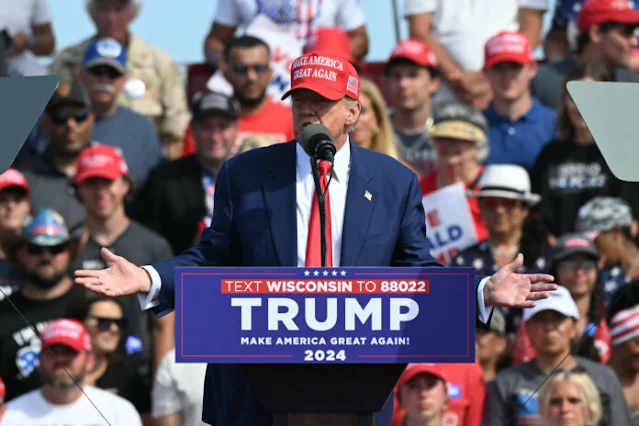 |
| Former US President Donald Trump has also promised to import the "best and the brightest around the world to America" |
Donald Trump, the front-runner for the Republican presidential nomination, has pledged to provide foreign graduates of US institutions automatic Green Cards. According to Trump, it is imperative to stop talented students from going back to their native nations—such as China and India—where they can go on to become multibillionaires.
Donald Trump, the Republican nominee for president, promised to issue Green Cards to international graduates of US universities automatically. In a podcast, Trump said that the move was needed to prevent bright students from returning to their home countries like India and China, where they become multibillionaires.
It is a kind of volte-face for Donald Trump, who has had a hard anti-immigrant stance, ahead of the November election.
Immigration is one of the key election issues in the US. A recent poll by Pew Research Centre showed that 59% of registered US voters wanted citizenship to be awarded to immigrants.
“What I want to do and what I will do is --you graduate from a college, I think you should get a Green Card automatically as part of your diploma, a Green Card to be able to stay in this country. And that includes junior colleges too,” Trump said in the 'All-In' podcast.
Trump, a former US President, spoke of “stories where people graduated from a top college or from a college, and they desperately wanted to stay here, they had a plan for a company, a concept, and they can’t - they go back to India, they go back to China, they do the same basic company in those places".
"...And they become multi-billionaires employing thousands and thousands of people, and it could have been done here," Trump said.
The podcast was hosted by four venture capitalists: Chamath Palihapitiya, Jason Calacanis, David Sacks, and David Friedberg, three of whom are immigrants, according to a PTI report.
"Let me just tell you that it's so sad when we lose people from Harvard, MIT, from the greatest schools, and lesser schools that are phenomenal schools also. And what I wanted to do, and I would have done this, but then we had to solve the Covid problem because that came in and, you know, sort of dominated for a little while, as you perhaps know,” Trump said in response.
In 2023, the US issued a record over 1,40,000 visas to Indian students. The rush is more this year.
The US embassy in India is gearing up to handle a significant increase in student visa applications from Indian students in 2024. To accommodate the surge in student applications from India, the embassy has started interviews earlier than usual.
A green card, officially known as a Permanent Resident Card, is a document issued by the US government that grants the holder permanent resident status.
Donald Trump has mostly been a proponent of a merit-based citizenship policy.
In the podcast, he reiterated his first-term policy about foreign students getting a Green Card after receiving a degree from a higher education institution in the STEM (science, technology, engineering, and maths) field.
“Anybody graduates from a college, you go in there for two years or four years. If you graduate, or you get a doctorate degree from a college, you should be able to stay in this country," Trump said.
"We force the brilliant people, the people that graduate from college, the people that are number one in their class from the best colleges, you have to be able to recruit these people and keep the people,” he asserted.
Somebody graduates at the top of the class; they can't even make a deal with the company because they don't think they're going to be able to stay in the country.
"That is going to end on day one,” Trump announced.
According to the latest annual Open Doors report of the Institute of International Education, more than a million international students from more than 210 places of origin are studying at US higher education institutions during the 2022-23 academic year.
During his term as president, Trump’s immigration agenda included restrictions on green cards, visa programmes, refugee resettlement and other forms of legal immigration, significantly reducing the number of lawful permanent residents entering the country.
Throughout his presidency, Trump assailed the H-1B visa program, favoured by tech companies as a way to hire foreign skilled workers, as a “theft of American prosperity.”
The H-1B visa is a non-immigrant visa that allows US companies to employ foreign workers in specialty occupations that require theoretical or technical expertise. Technology companies depend on it to hire tens of thousands of employees each year from countries like India and China.
Trump expanded restrictions on legal immigration during the pandemic and his last year in office and proposed suspending all immigration to the United States and deporting foreign students if they did not attend at least some classes in person. A month before the 2020 election, Trump again moved to restrict the H-1B visa programme.
So, this change of stance would boost the hopes of thousands of Indian students who are graduating or planning to graduate from US colleges.













0 Comments:
Post a Comment